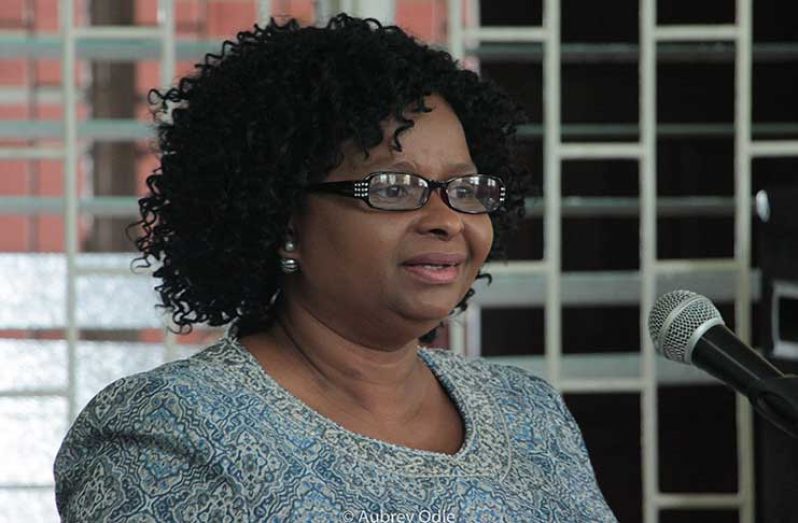DEMERARA Tobacco Company Limited (DEMTOCO) – a subsidiary of British American Tobacco Group – has secured a meeting with the Public Health Ministry on the Tobacco Control Act and its accompanying regulations.
According to DEMTOCO Managing Director, Maurlain Kirton, that meeting could happen within the next two weeks. “The intention of that meeting is to ensure that Demerara Tobacco remains a very strong and reputable corporate citizen, continues to exist, adapts to the legislation that is there, but the legislation needs to be enforceable,” Kirton told Guyana Chronicle on the sideline of DEMTOCO’s 84th Annual General Meeting (AGM) at the Pegasus Hotel on Tuesday.
Kirton said the tobacco company has six main areas of concern with respect to the Tobacco Control Act which became law in August 2017 after the bill was passed by the National Assembly and assented to by President David Granger.
According to her, Public Health Minister Volda Lawrence has agreed to meet with DEMTOCO through a third party. “We have supplied her with an agenda, and we are hopeful that the meeting happens very soon. In another two weeks we are prepared to sit down and have an engagement,” she posited.
Part VI of the Act addresses the issues of advertising, promotion and sponsorship. According to Section 19 “All advertising, promotion and sponsorship of tobacco products and electronic delivery systems are prohibited.”
It was stated that the prohibition includes tobacco advertising, promotion and sponsorship that promote or are likely to promote the tobacco industry, directly or indirectly.
PAHO/WHO National Consultant, Attorney-at-Law Kesaundra Alves, had explained that the comprehensive ban of all tobacco advertising, promotion and sponsorship is in keeping with Article 13 of the WHO Framework Convention on Tobacco Control (FCTC), noting that it was critical to block all loopholes the local tobacco industry may want to use to its advantage.
“The tobacco epidemic is one that is not spread by infection but by promotion and advertisement. Tobacco Advertising, Promotion and Sponsorship (TAPS) glamorises tobacco use by associating the use of tobacco products with positive social and personal images,” Alves said. According to her, stamping out all forms of TAPS is the only way to eliminate the tobacco epidemic.
DEMTOCO managing director said while the tobacco company will comply with the legislation, there are going to be some consequences.
“There is going to be an increase in illicit trade. It is at about 25 per cent of the total consumption, so while Demerara Tobacco continues to pay their fair share of revenue on taxes, a group of importers are not doing that, so the illicit trade is a problem and will continue to be a problem. From an industry’s perspective we believe that there is not strong enforcement and for the illicit trade not to grow at its current rate we need strong enforcement,” Kirton emphasised.
According to her, if good sense does not prevail and there is no compromise, Government can lose revenue from a legitimate company while the illicit trade increases.
In echoing similar sentiments, DEMTOCO Chairman Marcus Steele told Guyana Chronicle that implementation of regulations without consultation can be disastrous for both Government and the industry but he admitted there has been dialogue in the case of Guyana.
“I must say that they have been very open to listen to us,” he said.
While addressing the AGM, Steele disclosed that DEMTOCO’s management is currently instituting measures that would allow the company to smoothly transition into the new regulatory environment.
“These measures will certainly impact the way we have operated our business and so we take this opportunity to urge the Government to provide the requisite clarity and to exercise the comprehensive public education and raise awareness which is required to minimise dislocations and anxiety during the enforcement of the Act,” Steele told shareholders at the AGM.
In addition to the total ban on advertising and promotion, the Act provides for a ban on smoking in indoor public places, indoor workplaces and public transportation, and also in specified outdoor places including the premises of schools and health facilities, and places for the commercial service of food and drinks.
The Tobacco Control Act regulates where persons can smoke tobacco products in order to protect others from exposure to dangerous second-hand smoke, but it does not ban smoking.
On Wednesday, the Ministry of Public Health’s Public Relations Officer Terrence Esseboom told this newspaper that the regulations that will go hand-in-hand with the Tobacco Control Act are still being drafted.
According to Esseboom, the draft regulations, when completed, will be submitted to DEMTOCO, after which consultation on the implementation of the Tobacco Control Act and the accompanying regulations will commence. The regulations are expected to guide the sale, packaging, promotion and sponsorship of tobacco products, the health official explained.
The Tobacco Control Act took effect on December 11, 2017 following the issuance of a commencement order by Public Health Minister Volda Lawrence. However, the initial focus is on the tobacco industry.



.jpg)









